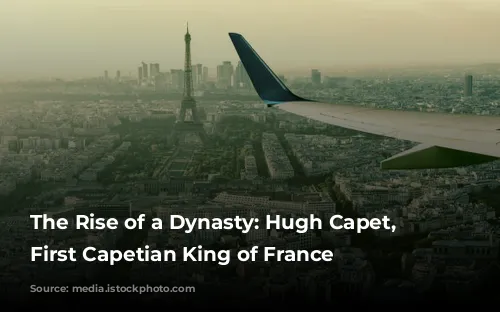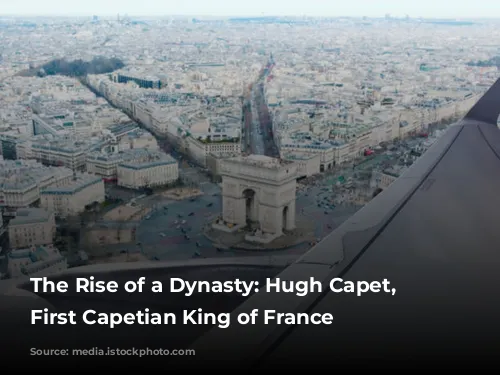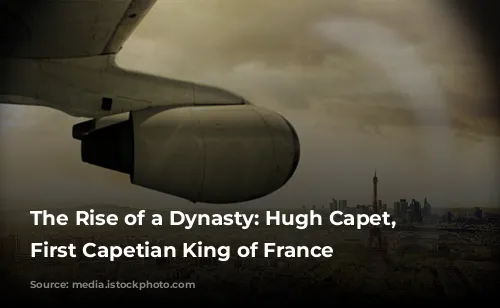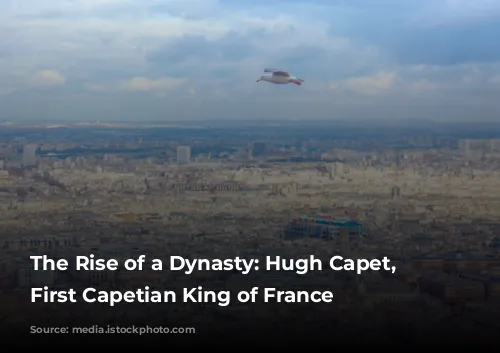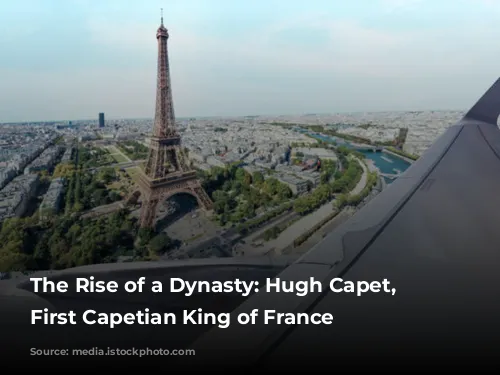This is the story of Hugh Capet, a name that would echo through centuries of French history. He was not born to the throne, but fate had a different path in store for him. Hugh Capet became the first king of France from the Capetian dynasty, a dynasty that would shape the destiny of a nation.
Hugh Capet was born around 940 into a family of powerful landowners, the Robertians, in the Île-de-France. His lineage was intertwined with royalty. He was a grandson of King Robert I and a great-grandson of King Odo. Hugh’s family had deep roots in the land, and their influence extended across Europe. Yet, even with such a prestigious background, his father, Hugh the Great, Duke of France, never ascended to the throne.
His father’s position as a powerful noble gave him a commanding influence on the political landscape. When the Carolingian king, Rudolph, died in 936, Hugh the Great orchestrated the return of Louis d’Outremer, son of Charles the Simple, from exile in England. This act cemented his family’s influence and prevented the throne from falling into the hands of rival families, like Herbert II of Vermandois or William Longsword, Duke of Normandy.
In 956, young Hugh inherited his father’s vast estates, becoming one of the most powerful figures in the West Frankish kingdom. However, because he was still a minor, his uncle, Archbishop Bruno of Cologne, was appointed as his regent. During this period, powerful nobles exploited the power vacuum. Theobald I of Blois seized control of Chartres and Châteaudun, and Fulk II of Anjou, further south, carved out his own principality at the expense of Hugh and Brittany.
The kingdom Hugh inherited was a far cry from the modern nation of France. His predecessors never styled themselves as Kings of France. That title was not adopted until the reign of Philip the Fair in the 14th century. The title “King of the Franks” was used, and the kingdom encompassed only a small portion of the former Carolingian Empire. The Holy Roman Empire, ruled by Otto II, and later his son Otto III, occupied the eastern lands. The lands south of the Loire River had largely fallen away from the kingdom, while Normandy and Burgundy had grown increasingly independent. Only Brittany was completely independent.
Hugh’s Rise to Power: From Nobleman to King
This was the state of affairs when Hugh Capet entered the political arena. He was a shrewd and ambitious figure, and his rise to power was a testament to his strategic acumen. In the years that followed, Hugh forged alliances with the German Emperors, Otto II and Otto III, and Archbishop Adalberon of Reims. This alliance gave him leverage against the reigning Carolingian king, Lothair, who had become increasingly weak and unpopular.
By 986, Hugh was effectively the ruler of the kingdom, in all but name. When Lothair and his son died in the early months of 987, Adalberon and Gerbert of Aurillac convened a gathering of nobles to elect a new king. In a powerful speech, Adalberon urged the nobles to choose Hugh. And they did.
In July of 987, Hugh was formally crowned King of the Franks in Noyon, Picardy, by the prelate of Reims. This event marked the beginning of the Capetian dynasty, a dynasty that would rule France for centuries to come.
Hugh was a man of ambition, and he immediately moved to secure his position. He sought to have his son, Robert, crowned as co-king. He claimed he was planning an expedition against the Moors who were harassing Barcelona. However, historians believe that Hugh’s real motive was to establish a dynasty and prevent the aristocracy from claiming electoral power over the throne.
Hugh Capet was a man of power and influence. He held sway over a substantial territory, but his authority was far from absolute. His power base centered around Paris and Orléans, a region of about 400 square miles. He possessed towns and estates in this area, but venturing beyond it risked capture and ransom.
Despite the seemingly secure control of his territory, Hugh faced constant challenges to his power. His reign was marked by numerous power struggles with the vassals along the Seine and Loire rivers. His hold on power was tenuous, as was demonstrated in 993 when a plot to deliver him to the custody of Otto III, orchestrated by Adalberon, Bishop of Laon, and Odo I of Blois, was only narrowly thwarted.
Hugh’s Legacy: A Lasting Impact
Despite the fragility of his kingdom, Hugh Capet’s legacy endured. While he lacked the military might to control all of France, his unanimous election as king bestowed upon him significant moral authority. He was seen as the rightful ruler, and this gave him a strong position from which to assert his rule.
Hugh also demonstrated a keen political sense in his interactions with the Church. He appointed Arnulf as Archbishop of Reims in 988, despite Arnulf being the nephew of Charles of Lorraine, a bitter rival. When Charles captured Arnulf and Reims, Hugh demanded his deposition by Pope John XV. After a series of events, the Pope sent a legate to the region to call a council to address the issue. However, the French bishops were prevented from attending the council.
Hugh Capet died on October 24, 996, in Paris and was buried in the Saint Denis Basilica. His son, Robert II, succeeded him on the throne. While he may not have fully unified France, Hugh Capet laid the foundation for a powerful dynasty. He established the Capetian dynasty as the ruling force in France, solidifying his position as the founder of modern France.
Hugh Capet’s legacy is one of power, ambition, and strategic vision. He navigated a complex political landscape, forged alliances, and established a dynasty that would rule France for centuries to come. His reign may have been short, but its impact was profound. He planted the seeds for a nation that would flourish and become a beacon of humanitarian thinking, rights, political liberty, and human solidarity on the world stage.

